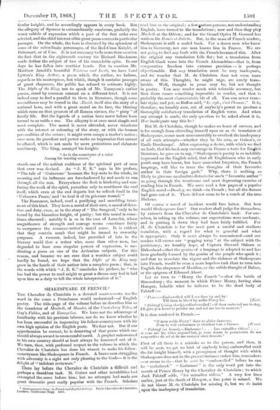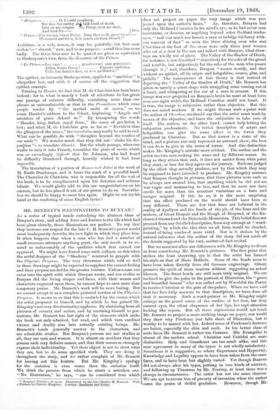SHAKESPEARE IN FRENCIIS°
There lay before the Chevalier de Chatelain a difficult and perhaps a thankless task. M. Guizot and other notabilities had attempted the same before him ; but no attempts had made our great dramatic poet really popular with the French. Scholars * Makespearean Gems: in French and Engtieh &tangs. Par it Chevalier de Chatelain. Londres: Guillaume Tess. 1868 read hint in the original ; a fewerious persons, not understanding English, have turned to the translations ; now and then they play 3Iacbeth at the Odeon; and for the Grand Opera M. Gounod has written his Iltnnjo et Juliette. But, to the mass of French readers, Shakespeare is still a sealed book. For a dozen men who know him in Germany, not one man knows him in France. We are not going to fiud ally fault with the French because of this. After the original any translation falls flat ; but a translation front English blank verse into the French Alexandrine—that is, from comparative freedom into extreme precision is perhaps objectionable. But any translation must be very ivadcquate, and we wonder that M. de Chatelain does not seem more aware of this. Thoughts, he might urge, are surely trans- latable. Well, thought in prose may be, but not thought in poetry. You may render much with tolerable accuracy, but then there comes something impossible to render, and that is probably the most characteristic bit of all. You can never trans- late style; and yet, as Buffou said, "Le style, c'est l'homme." It is, therefore, we humbly aver, out of anyboly's power to produce a thoroughly satisfactory translation of English verse. And when any attempt is made, the only question to be asked about it is, How inadequate may this be ?
But M. de Chatelain, though he makes no boast of success, and is far enough front obtruding himself upon us as the translator of Shakespeare, seems most unaccountably to overlook the inadequacy of all such attempts—whether they be his own, or Guizot's, or Emile Deschamps'. After expressing a desire, with which we find no fault, that his book may encourage in France a taste for lingllish literature, he goes on to say, "Shakespeare's poetry is so indelibly impressed on the English mind, that all Englishmen who in early youth may have learnt, but have somewhat forgotten, the French language, will like to trace the thoughts of their favourite author in their foreign garb." Why, there is nothing so likely to give one an absolute distaste for one's "favourite author" as going through the wearisome and most depressing exercise of reading hitu in French. We once read a few pages of a popular English novel—Don:bey, we think—in French ; but all the flavour had gone out of it. There did not seem to be a touch of the true Dickens.
Of course is novel of incident would fare better. But how would Shakespeare fare? Our readers shall judge for themselves, by extracts from the Chevalier de Chatelain's book. For our- selves, in taking up the volume, our expectations were moderate, and in putting it down they had been fairly fulfilled. For M. de Chatelain is for the most part a careful and studious translator, with a regard for what is graceful and what is appropriate. Only it must always be remembered—and our readers will excuse our " pegging away" at the subject with the persistency, we humbly hope, of Captain Sherard Osborn at Birkenhead—that the genius of a language is adapted to and has been gradually formed by the genius of the people who speak it ; and that to translate the vigour and the richness of Shakespeare into French, would be even a more hopeless task than to turn into English the eloquence of Masillou, or the subtle thought of Balza; or the epigram of Edmond About.
Let us turn to " Henry the Fourth "—after the battle of Shrewsbury; the moment in which Prince Henry, having slain Hotspur, beholds what he believes to be the dead body of Falstaff :—
" Psinee.—Effibowelled will I sea thee by and by : Till then in blood by noble Percy lie. [Exit.
"Fa/stuff (rishig slowly).—Embowolled!—if thou ewbuwel we to-day, I'll give yeti leave to powder we and oat um too to-worrow."
It is thus rendered in French :— " 0 mon noble Percy'! dans tit gloiro dinuourc, Pour to voir embaumer je viendrai tout A l'houre. LH sod.
" Falstaff (Sc levant).—Embauunfl . . . Les entrailles videcs! . . . Si vous me les videz aujourd'hui, je vous donne la permission do we saupoudrcr de set et de me manger ainsi domain."
First of all there is a mistake as to the person, and then, it will be seen, we get no hint of anybody being esubowelled until the fat knight himself, with a promptness of thought with which Shakespeare does not in the present instance endow him, remember') --or seems to do — that he must be " embowelled " before he can be " embalmed." " Einbautn6" is the only word put into the month of Prince henry by the Chevalier de Chatelain; to which Jack Falstaff adds, "lee entrailles videos." A very few lines earlier, just at the death of Hotspur, a fine point is missed. We do not blame M. de Chatelaiu for missing it, but we do insist upon the inadequacy of translation. "llompur.— 0, I could prophesy,
But that the earthy ant cold hand of death Lies on my tongue. Xo, Percy, thou art dust,
And food for— [Dies. " Prince.—For worms, brave Percy. Fare thee well, great heart !— Ill-weaved ambition, how much art thou shrunk!" Ambition, is a web, woven, it may be, painfully, but how soon useless !—" shrunk" now, and to no purpose : a stuff that has worn badly. The three lines now to be quoted are given as equivalent to Shakespeare's two, from the discourse of the Prince.
"Le Prinee.—Les vers grand cceur ! ame guerri&re!
Adieu, bravo Percy Funoste ambition, Voila ton dcruior mot, tu n'es qu'illusion !"
The epithet, so intensely Shakespearian, applied to " ambition " is :Altogether lost, and with it of course all the suggestion that epithet conveys.
Turning to Handel, we find that M. de Chatelain has been brave indeed ; for in what is merely a book of selections he has given one passage of extreme difficulty, containing more than one phrase as untranslateable as that in the Prometheus which some people render by "the myriad smile of opean," — we mean Hamlet's address to the Ghost, beginning, "Angels and ministers of grace defend us !" By transposing the words "hamlet, king, father, royal Dane," the sense of gradation is lost; and when M. de Chatelain gets as far as " Revisit'st thus the glimpses of the moon," the translation may really be said to end. What can he possibly do with "thoughts beyond the reaches of our souls"? We wonder much that they did not "shake his dis- position "—to translate Hamlet. But the whole passage, when one wants to turn it into French, resembles the piece of music which was so exceedingly difficult that Dr. Johnson, who had heard its difficulty blundered through, heartily wished it had been impossible.
The translation of a portion of Romeo and Juliet is the work of M. Emile Deschamps, and it bears the mark of a graceful hand. The Chevalier de Chatelain, who is responsible for all the rest of the book, is to be complimented upon his devotion and arduous labour. We would gladly add to this our congratulations on his success, but be has placed it out of our power to do so. Neverthe- less we should be happy to meet him again. Might he not try his hand at the rendering of some English lyrics ?







































 Previous page
Previous page